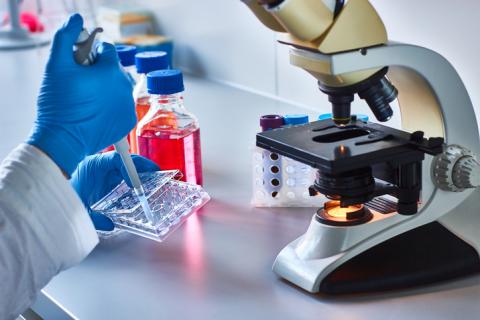As a PhD researcher at the Cancer Research UK Beatson Institute in Glasgow, I spend my time looking at pancreatic cancer cells and how they use energy differently from normal cells. Finding this out could help us specifically target pancreatic cancer cells, leaving healthy cells unharmed.
I chose to focus on this because I am completely fascinated by the complexity of cancer - it breaks every rule in the book that normal cells are dependent on for survival. I also really enjoy the research process, from exploring our initial ideas, to planning exciting experiments and analysing the data.
Choosing the right topic for your PhD is so important, and I looked at lots of different programmes before I chose mine. When I found my current PhD project on the Cancer Research UK Beatson Institute website I got so excited, as this was the only project title I’d found that I felt I really wanted to dedicate four years of research to! The research focused on cancer and metabolism, a topic I became fascinated about during a summer internship at the Beatson after my first year of my undergraduate degree.
I didn’t have a master's degree, so applying for a straight PhD project was my wild card. I therefore decided to apply for other courses which accepted students who hadn’t done a master’s, including the Wellcome Trust 1+ 3 year PhD programme at the University of Cambridge. I felt that for my next chapter I wanted to live somewhere I loved, which for me is either somewhere in Scotland or Cambridge.
I was thrilled to get accepted on the PhD project at the Beatson after interviews with my current supervisors, but I then had a nerve-wracking wait to find out if I would get funding.
However, before the interview, I was offered a place at Edinburgh, and I only had 48 hours to accept the offer, which would have meant losing out on my place at Beatson. Luckily after explaining my dilemma, my supervisor was able to find guaranteed funding for my place. I’m originally from Scotland, and I feel incredibly lucky live somewhere I love, reconnecting with old friends and researching my passion.
What I love about my PhD is that I work across two labs - one with a biological focus, working with cells and tissues and the other with a more chemical approach. I get to split my time between raw biology with cells and tissues, and chemistry based analysis of my samples. This means my work is diverse and I can play to my strengths.
Science subject guides
What can you do with a medical degree?
We often joke that you need to take care of the cells we are working with "as if they’re your babies". They need 24-hour care to receive food, heat and space to grow, and I often work antisocial hours to look after them. The support I receive through Cancer Research UK ensures I have proper resources so I can focus on designing the best experiments and planning long-term.
Almost everyone knows at least one person who’s been affected by cancer – their stories and enthusiasm about my research inspires me every day. I’ve seen first-hand what funding from Cancer Research UK can achieve for these patients. I believe whole-heartedly in our work – it’s not just a job for me.
That’s why earlier this year I ran the London Marathon and raised more than £2,000 which was overwhelming. It’s also why I share my progress with supporters as part of the Sponsor a PhD Researcher programme. My research is my passion so it is great to be able to raise awareness of all the exciting new developments.
Grace McGregor is part of the Cancer Research UK Sponsor a PhD Researcher programme and is a third year PhD researcher at the Cancer Research UK Beatson Institute.

Comments